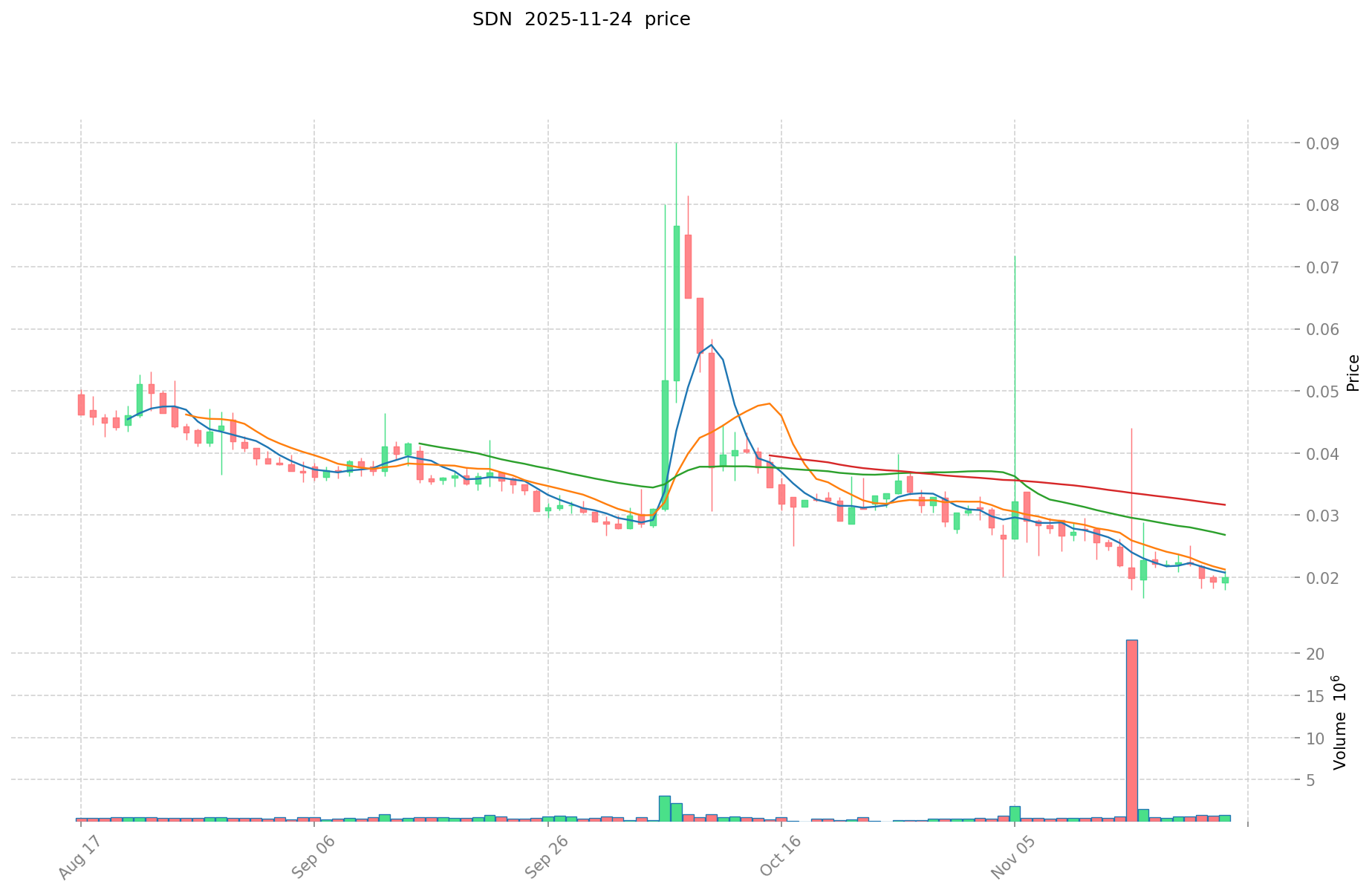What is SDN: Revolutionizing Network Management in the Digital Age
ShidenNetwork's Positioning and Significance
In 2021, ShidenNetwork (SDN) was launched as a multi-chain decentralized application layer on the Kusama network. It aims to solve the lack of smart contract functionality on the Kusama relay chain.
As a Canal network serving as the R&D chain for Plasm Network, ShidenNetwork plays a crucial role in the DeFi and NFT sectors within the Kusama ecosystem.
As of 2025, ShidenNetwork has become an integral part of the Kusama ecosystem, supporting various applications and boasting an active developer community.
Origin and Development History
Birth Background
ShidenNetwork was created in 2021 to address the need for a smart contract layer on the Kusama Network. It emerged during the blockchain technology boom, aiming to enable diverse applications such as DeFi and NFTs on Kusama.
ShidenNetwork's launch brought new possibilities for developers and users within the Kusama ecosystem.
Important Milestones
- 2021: Mainnet launch, supporting Ethereum Virtual Machine, WebAssembly, and Layer2 solutions from the start.
- 2021: SDN token distribution to PLM token holders at a 1:1 ratio.
With support from its community and developers, ShidenNetwork continues to optimize its technology, security, and real-world applications within the Kusama ecosystem.
How Does ShidenNetwork Work?
Decentralized Control
ShidenNetwork operates on a decentralized network of computers (nodes) spread across the globe, free from control by any single entity. These nodes collaborate to validate transactions, ensuring system transparency and attack resistance, empowering users with greater autonomy and enhancing network resilience.
Blockchain Core
ShidenNetwork's blockchain is a public, immutable digital ledger that records every transaction. Transactions are grouped into blocks and linked through cryptographic hashes, forming a secure chain. Anyone can view the records, establishing trust without intermediaries.
Ensuring Fairness
ShidenNetwork likely employs a Proof-of-Stake (PoS) consensus mechanism to validate transactions and prevent fraudulent activities like double-spending. Validators maintain network security through staking and running nodes, receiving SDN rewards for their efforts.
Secure Transactions
ShidenNetwork uses public-private key encryption to protect transactions:
- Private keys (like secret passwords) are used to sign transactions
- Public keys (like account numbers) are used to verify ownership
This mechanism ensures fund security while keeping transactions pseudonymous.
ShidenNetwork (SDN) Market Performance
Circulation Overview
As of November 25, 2025, ShidenNetwork's circulating supply is 67,959,683.96304666 tokens, with a total supply of 87,201,864.22680207.
Price Fluctuations
ShidenNetwork reached its all-time high of $8.36 on September 12, 2021.
Its lowest price was $0.01801155, occurring on November 23, 2025.
These fluctuations reflect market sentiment, adoption trends, and external factors.
Click to view the current SDN market price

On-Chain Metrics
- Daily Trading Volume: $8,765.3188738 (indicating network activity)
- Active Addresses: 13,108 (reflecting user engagement)
ShidenNetwork Ecosystem Applications and Partnerships
Core Use Cases
ShidenNetwork's ecosystem supports various applications:
- DeFi: Projects providing decentralized financial services.
- NFT: Platforms enabling digital collectibles and unique digital assets.
Strategic Collaborations
ShidenNetwork has established partnerships to enhance its technological capabilities and market influence. These partnerships provide a solid foundation for ShidenNetwork's ecosystem expansion.
Controversies and Challenges
ShidenNetwork faces the following challenges:
- Technical Issues: Potential scalability bottlenecks or transaction delays.
- Regulatory Risks: Uncertain regulatory environment for cryptocurrencies.
- Competitive Pressure: The rise of other blockchains in the smart contract space.
These issues have sparked discussions within the community and market, driving continuous innovation for ShidenNetwork.
ShidenNetwork Community and Social Media Atmosphere
Fan Enthusiasm
ShidenNetwork's community shows vitality, with active wallet addresses and transaction volumes.
On X platform, related posts and hashtags (like #ShidenNetwork) occasionally trend.
Social Media Sentiment
Sentiment on X presents a mixed picture:
- Supporters praise ShidenNetwork's smart contract capabilities and its role in the Kusama ecosystem.
- Critics focus on potential scalability issues or market performance concerns.
Recent trends show varying sentiment depending on market conditions and project developments.
Hot Topics
X users discuss ShidenNetwork's role in the Kusama ecosystem, its smart contract functionalities, and its potential for hosting decentralized applications.
More Information Sources for ShidenNetwork
- Official Website: Visit ShidenNetwork's official website for features, use cases, and latest updates.
- Documentation: ShidenNetwork docs provide detailed technical information and guides.
- X Updates: On X platform, ShidenNetwork uses @ShidenNetwork, covering topics such as technical upgrades, community events, and partnership news.
ShidenNetwork Future Roadmap
- Ecosystem Goals: Support a growing number of DApps and attract more users to the platform.
- Long-term Vision: Become a leading smart contract platform within the Kusama ecosystem.
How to Participate in ShidenNetwork?
- Purchase Channels: Buy SDN on Gate.com
- Storage Solutions: Use Web3 wallets compatible with Kusama ecosystem tokens
- Participate in Governance: Engage in community decisions through the project's governance mechanisms
- Build on the Ecosystem: Visit the developer documentation to develop DApps or contribute code
Summary
ShidenNetwork redefines blockchain technology by providing smart contract capabilities within the Kusama ecosystem, offering transparency, security, and efficient decentralized applications. Its active community, rich resources, and position in the Kusama network make it stand out in the cryptocurrency field. Despite facing challenges such as potential regulatory hurdles or technical bottlenecks, ShidenNetwork's innovative spirit and clear roadmap secure its important position in the future of decentralized technology. Whether you're a newcomer or an experienced player, ShidenNetwork is worth watching and participating in.
FAQ
What is SDN in the USA?
SDN stands for Specially Designated Nationals, a list maintained by the U.S. Treasury to identify individuals and entities subject to economic sanctions.
Is SDN still relevant today?
Yes, SDN remains highly relevant. Its adoption in cloud networks is growing, and it's increasingly applied in various network environments, showcasing its ongoing importance and potential for future innovations.
Does 5G use SDN?
Yes, 5G networks utilize SDN for enhanced network management and flexibility. SDN provides centralized control, crucial for 5G's efficiency and performance.
What is an SDN company?
An SDN company uses software-defined networking to manage networks, separating control from data planes for improved efficiency and flexibility.
Share
Content